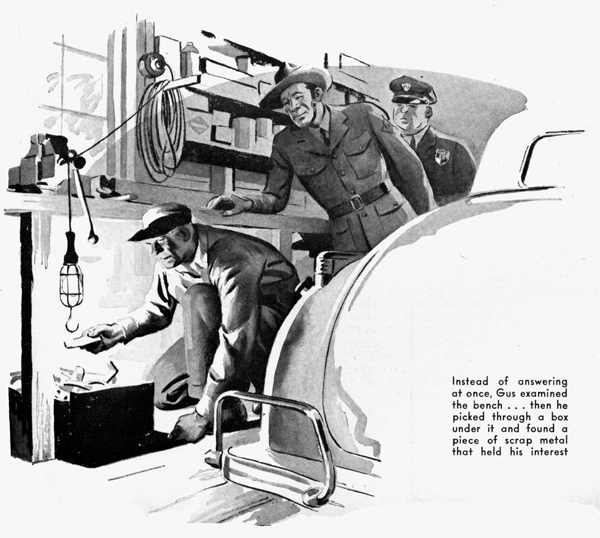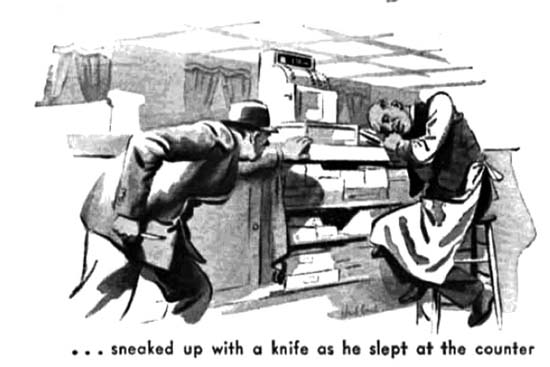October 1943
GUS SOLVES
THE CASE OF THE BRASS CLUE
by Martin Bunn

Gus Wilson had just started work on his first job of the morning when State Trooper Jerry Corcoran came briskly into the Model Garage shop. As always his gray-blue uniform was immaculate, gleaming boots competing with the luster of his Sam Brown belt, his broad-brimmed felt hat tilted at its habitual jaunty angle. But Gus saw that he was worried, that his gray eyes were tired.
"Hi, Jerry!" he greeted him. "Hear you had a murder on your beat last night."
Jerry perched himself on the end of the workbench, fished a pack of cigarettes out of his breast pocket, and lighted one. "Yes," he said, "we did. George Oxdallas . . . in his juke joint. It was me who found him."
"Shot ?" Gus asked.
"Nope, throat cut." Jerry wrinkled his nose at the recollection. "As near as we can figure it out, he had fallen asleep behind his cash register, and the guy who got him sneaked up with a knife, reached around, and sliced him. Oxdallas had a gun in the counter drawer, but he never had a chance."
"Haven't you got anything to go on?" Gus wanted to know.
"Yes," Jerry said. We've got a lot to go on -- but the trouble is it doesn't add up. Look here, Gus -- I'm going to tell you the whole story. Some of it's in your line, and maybe you can help me."
Gus lighted his pipe. "Shoot!" he advised briefly.
"First, about Oxdallas," Jerry said. "About the time the war plants opened, he sold a couple of coffee spots down in the city and started his joint up here. I guess he did all right -- it's in a good spot, and a lot of the boys and girls who get through at midnight stop by there."
"Sure" Gus agreed. "A fellow who works half the night needs a little recreation."
"Now we come to Con Constantine," Jerry went on. "Ever been in his pool room?"
"Young man," Gus said severely, "I'm a respectable citizen even if I'm not a family man, and I'm old enough to have the sense to keep out of back-street pool rooms."
"Sure," Jerry said, and grinned. "Well itís a tough joint, and Constantine is a bad egg. He started off all right as an automobile mechanic, but he got mixed in a lot of shady deals -- he's been pinched a half dozen times, down in the city, but he always got off."
"Now here's the important part. I passed Oxdallas's place about half past two this morning. I was on my motorcycle, guiding an Army truck convoy that was in a heck of a hurry. There were maybe a dozen cars parked in front, and I could see people dancing. Nothing unusual about that, but about a hundred yards below, pulled up in the brush on a dead-end lane, was a convertible coupe with the lights off. I'd swear it was Constantine's. He stops at Oxdallas's now and then. But why would he want to park up that lane instead of in front?"
Gus grunted, but said nothing.
"That kept bothering me," Jerry admitted, "but I had to guide the convoy to the city line. When I got back to Oxdallas's it was a quarter past three. The car was gone from the lane. So were the cars that had been standing in front. But all the lights were on bright, so I thought I'd stop in and see what was going on . . . I've told you what I found."
Jerry reached inside his tunic and brought out two folded papers. He opened one and handed it to Gus. "That's a photograph, enlarged to life size, of a tire track we found up the lane."
Gus examined the print carefully. "It looks as if the tire had a worn spot on one side," he commented. "Chances are it was caused by scuffing, due to bad alignment."
Jerry grunted and passed Gus the second print. "That's the left front tire on Constantine's coupe," he said. He waited as Gus compared the two. "What do you say?"
"I'd say that Constantine's car made that track," Gus said. "It looks to me as if you have a strong case."
"To make it stronger," Jerry said, "we had a lab specialist up from headquarters, and he made a plaster cast of the track. Constantine's tire fits every indentation.
"Further than that," Jerry went on, "we can prove that night before last, in a stud game in his back room, he lost so much to some big city gamblers that it took every dollar he had to square up."
"Well," Gus said, passing the two prints back to him, "why don't you arrest him?"
"He's under arrest, all right," Jerry said. "But only for running a gambling joint. He has an alibi.
"Sure I parked up the lane," he said," -- to watch the birds. But it was yesterday afternoon. So what?"
"Constantine claims that his car couldn't have been there at half past two this morning -- because when he tried to start it about eight o'clock last night something went wrong and it blew a spark plug right out of the cylinder head! Before nine o'clock he had called three garages trying to get a new cylinder head in a hurry, and when he couldn't find one, he told Joe Moss to order one from the city for him this morning. We checked on the calls, and it's true, too, that there's a spark plug missing from his motor. It looks as if it had been blown out the way he says it was -- the threads in the spark-plug hole are ripped clean out. You can't drive a car with an open hole in a cylinder head, can you, Gus?"
Gus puffed at his pipe for a full minute before he answered. Then all he said was: "I haven't seen Constantine's car, Jerry."
Jerry grinned and slid down off the work-bench. "Let's go," he invited.
Constantine's pool room was in what once had been a fine residence; his garage, opening on a narrow alley, had been the stable. A policeman sitting on a box at the door grinned wisely as Jerry parked his car in the alley. Jerry led the way into the garage.
Constantine's convertible coupe was standing there, its hood raised. There was a workbench with a few tools on it; shelves over the bench held spare parts and odds and ends. The place was clean and neat.
"This guy was a good mechanic before he turned crook," Jerry remarked. He pointed to the coupe's engine. "There she is, Gus. What do you make of it?"
Gus examined the engine carefully. One of the plugs was missing. He ran a forefinger around the circumference of the empty hole and found that all the threads, except the bottom one, were gone.
"Well, how about it?" Jerry demanded anxiously. "Do plugs ever blow out?"
"Once in a great while," Gus told him. "It's uncommon, but it does happen."
Jerry looked disappointed. "Then he could be telling the truth ?" he asked.
Gus didn't answer. He went over to the workbench, and carefully examined everything on it. Then he did the same thing with the shelves. A couple of dust-covered taillight bulbs interested him, but after looking at them he put them back. Then he began going through scrap metal in a box under the bench. Jerry saw him nod when he picked up a small, flat piece of brass. He took it to the window, examined it carefully, nodded again, and put it in his pocket.
"What is it?" Jerry asked anxiously. But Gus went back to the car. "Jerry," he said, after a pause. "You asked me if Constantine could have run this car with the spark-plug hole open in the cylinder head. Well, he could have, but . . .
Jerry's face brightened.
"But it would have made enough noise to wake the dead, and oil would have spattered everything under the hood."
"He cleaned up afterwards," Jerry began. "No," Gus cut in. "See this engine. It has regular layers of oil and dirt." He scraped through some of them with his pocketknife. "Just what you'd expect on a motor that's been run a lot. If Constantine had cleaned off the new oil, the engine would be a lot cleaner now--most of this old oil and dirt would have come off, too."
Jerry was crestfallen. "We're sunk," he said. "Constantine was telling the truth."
"I wouldn't be too sure about that," Gus grinned as he went back to the workbench. He got one of the dusty bulbs.
This is an ordinary burned-out taillight bulb," he explained. "Watch what I do with it now."
He broke the bulb and picked all the glass and cement from its socket, leaving a small brass cylinder. From a box he took a new 14-mm. spark plug, measured the threads, and cut the cylinder down to the exact length. Then he took the cylinder and the spark plug over to the car.
"Notice," he told Jerry, "that the bottom thread in the spark-plug hole wasn't ripped out when the rest were." He pushed the brass shell gently into the hole. "That bottom thread forms a shoulder that keeps the shell from slipping down into the cylinder." He pushed the spark plug a fraction of an inch into the shell, and then began to screw it slowly into place. "What's happening now," he said, "is that the spark plug is cutting its own threads in the brass, and the cylinder is expanding to accommodate them." Then he connected the plug, got into the car, and stepped on the starter.
The engine took hold promptly and ran smoothly.
Gus switched off the ignition and got out. "That proves," he said, "that Constantine could have driven his car to Oxdallas's place last night. I fixed up a car that way a couple of years ago, and it ran O.K. for four days, until we got a new head."
"Say.'" Jerry exploded. Then his face fell. "It proves Constantine could have driven his car last night -- but it doesn't prove that he did drive it, or even that he knows the trick you pulled."
Gus took the piece of brass from the scrap box out of his pocket.
"This is the socket of a taillight bulb that Constantine flattened out by stepping on it," he said. "He did just what I've done -- provided a substitute for the threads in the spark-plug hole to hold the plug in place."
With the blade of his penknife and a stub of pencil he carefully worked the flattened brass back to its cylindrical form. Then he held it to the light and squinted through it. "Look, Jerry--you can see the threads that the spark plug cut."
Jerry looked. "I guess," he said, "I'd better talk to the chief."
Late that night Gus's bedside telephone jangled. Jerry's voice on the wire was both tired and triumphant.
"It worked," he said. "When we took him down to his garage and showed him how you'd fixed his motor so it'd run, and then showed him your brass clue, he gave up and came clean . . . Yes, confessed . . . No, it was just plain robbery--he got over a thousand out of Oxdallas's cash box. No, blowing the spark plug out of the cylinder head was accidental. It was after he'd fixed it so that he could use his car that he realized he had a good alibi if he needed it . . . The chief is writing you a letter, Gus -- I'd have it framed if I were you! Me? All I want is twelve hours' sleep!"
END
L. Osbone 2019
